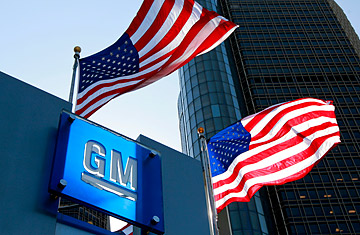
The General Motors headquarters building in Detroit
Since taking over as General Motors chairman in June 2009, Ed Whitacre has demonstrated impatience with the company's storied insular culture by running through no fewer than three different marketing chiefs and eliminating scores of reports. But the vagaries of the U.S. car market could slow one of Whitacre's signature projects: an initial offering of stock in the new GM.
In off-the-cuff remarks to reporters after a recent speech in Texas, Whitacre said he very much wanted to get the IPO done soon. Officially, however, GM has declined to say when it plans to move ahead with the sale of new shares. Nor has it filed the prospectus, despite rumors floating around Wall Street that it is coming any day.
Whitacre's problem — GM's problem — is that consumers aren't cooperating. GM's sales are up 14% through the first half of 2010, but the month-to-month figures carmakers use to measure sales momentum have declined lately. The problem isn't unique to GM, which saw sales slip roughly 10% in June after an 8% drop in May; other carmakers are suffering similar month-over-month declines. Bob Carter, vice president of sales operations for Toyota, which saw sales drop 11% from May to June, said the slumping sales data also reflects worrisome regional variations. "The East Coast and Midwest continued to show growth, but sales on the West Coast were essentially flat while sales in states around the Gulf of Mexico actually declined year over year," Carter said, suggesting the massive BP oil spill has disrupted the regional economy.
At the national level, consumer confidence, one key indicator of car sales, has also declined and job creation is not yet humming. Then there's the two-month fall in the stock market, notwithstanding last week's minirally. "The volatility in the financial markets is having an impact on new-vehicle sales," notes Jesse Toprak, vice president of industry trends at TrueCar.com, which tracks car sales. "The recovery is not as robust as we predicted at the beginning of 2010," he says, adding that new-vehicle sales are unlikely to improve until people become more confident about the economic recovery. The window for a successful IPO is probably "months away," says Toprak.
Van Conway of Conway MacKenzie, a restructuring advisory service in Birmingham, Mich., says he is confident GM can eventually launch a successful IPO, but it could get 30% more for its shares once car sales have moved onto a more sustainable path. GM is reportedly hoping to raise close to $20 billion through a successful IPO.
The pricing problem appears to be the key issue on the IPO question. "I know a lot of [Wall Street] guys are scratching their heads because of the state of the economy," says Joseph Phillippi, a former securities analyst who now runs his own consulting business. "You can get a deal done. But you may not get the target price," Phillippi says.
So what, if any, would be the negative consequences of waiting? "GM is under no immediate financial pressure to start selling shares to the public since funds raised will be used to cash out a portion of the government's ownership plus pay down a portion of the unfunded $27 billion pension liability," notes Brad Coulter of O'Keefe & Associates in Bloomfield Hills, Mich., an auto-industry advisory firm. "With the ongoing weakness in the economy, continuing losses at Opel, plus uncertainty over possible UAW demands to reinstate benefits and wages, I think there is a good possibility the initial IPO [pricing] will fall short of target," says Coulter. He argues the company should wait until 2011 or 2012, when the U.S. economy — and GM's performance — will be better, or so he hopes.
